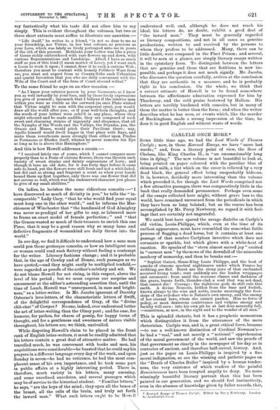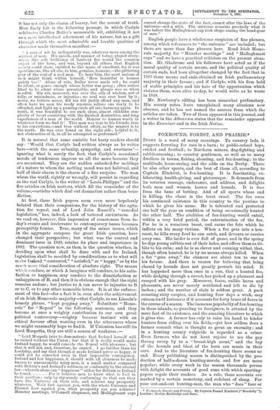CARLYLE ONCE MORE.*
SOME little time ago, we had the Last Words of Thomas
Carlyle ; now, in these Rescued Essays, we have " more last words;" and, from a literary point of view, the Seer of Chelsea, like King Charles II., is "an unconscionably long time in dying." The new volume is not beautiful to look at, being printed on paper coloured with the peculiar blue of skimmed milk, a tint which on the cover is relieved by a very dead black, the general effect being unspeakably hideous. It is, however, decidedly more interesting than the volume which preceded it, for though the Last Words comprised not a few attractive passages, there was comparatively little in the book that really demanded permanence. Perhaps even some of the essays collected here might, without grave loss to the world, have remained unrescued from the periodicals in which they have been so long belated ; but as the rescue has been accomplished by Mr. Percy Newberry, we regard it with feel- ings that are certainly not ungrateful.
We could best have spared the savage diatribe on Carlyle's old victim, Louis-Philippe, which, even at the time of its earliest appearance, must have resembled the somewhat futile process of flogging a dead horse, but it contains at least one passage of that sombre Carlylean invective which does not coruscate or sparkle, but which glows with a white-heat of emotion. He speaks of the " stern almost sacred joy " excited in "earnest men " by the news of the downfall of the miserable mockery of monarchy, and then he breaks out :—
" Sophist Guizot, Sham-King Louis Philippe, and the host of quacks of obscene spectral nightmares under which France lay writhing, are fled. Burst are the stony jaws of that enchanted accursed living tomb ; rent suddenly are the leaden wrappages and cerements : from amid the noisome clamm and darkness of the grave, bursts forth, thunder-clad, a soul that was not dead, that cannot die ! Courage : the righteous gods do still rule this earth. A divine Nemesis, hidden from the base and foolish, known always to the wise and noble, tracks unerringly the foot- steps of the evil-doer who is Nature's own enemy, and the enemy of her eternal laws, whom she cannot pardon. Him no force of policy, or most dexterous contrivance and vulpine energy and faculty will save : into his own pit he at last does assuredly fall, —sometimes, as now, in the sight and to the wonder of all men."
This is splendid rhetoric, but it has a prophetic momentum which distinguishes it from the utterances of the mere rhetorician. Carlyle was, and is, a great ethical force, because —to use a well-known distinction of Cardinal Newman's- he had a " real," and not merely a " notional " apprehension of the moral government of the world, and saw the proofs of that government as clearly in the newspaper of his day as in centuries of ancient, and therefore half-unreal, history. And, just as the paper on Louis-Philippe is inspired by a fine moral indignation, so are the winning and pathetic pages on the "Death of Charles Buller" inspired by a human tender- ness, the very existence of which readers of the painful Reminiscences have been tempted angrily to deny. No more winningly beautiful literary portrait than this has been painted in our generation, and we should feel instinctively, even in the absence of knowledge given by fuller records, that,
Rescued Essays of Thomas Caeyle. Edited by Per .y Newberry. Loudon he Leadeuhall
it has not only the charm of beauty, but the accent of truth. How finely felt is the following passage, in which Carlyle celebrates Charles Buller's memorable wit, exhibiting it not as a were intellectual adornment of his nature, but as a gift through which the most admirable and lovable qualities of character made themselves manifest :—
" A man of wit he indisputably was, whatever more among the wittiest of men. His speech, and manner of being, played every- where like soft brilliancy of lambent fire round the common object of the hour, and was, beyond all others that English society could show, entitled to the name of excellent, for it was spontaneous, like all else in him, genuine, humane, the glittering play of the soul of a real man. To hear him, the most serious of men might think within himself, ' How beautiful is human gaiety too!' Alone of wits, Buller never made wit ; he could be silent, or grave enough where better was going ; often rather liked to be silent where permissible, and always was so when needful. His wit, moreover, was ever the ally of wisdom, not of folly, or unkindness, or injustice ; no soul was ever hurt by it ; never, we believe never, did his wit justly offend any man, and often have we seen his ready resource relieve one ready to be offended, and light up a pausing circle all into harmony again. In truth, it was beautiful to see such clear, almost childlike sim- plicity of heart coexisting with the finished dexterities, and long experiences of a man of the world. Honour to human worth in whatever form we find it! This man was true to his friends, true to his convictions,—and true without effort, as the magnet is to the north. He was ever found on the right side; helpful to it, not obstructive of it, in all he attempted or performed."
It is natural that some amiable but hasty readers should say : Would that Carlyle had written always as he writes
here—with the same urbanity, sympathy, and sweetness '— ignoring what is surely the fact, that Carlyle's occasional moods of tenderness impress ns all the more because they are occasional. They are the sudden unlooked-for meltings of a nature to whom the melting mood was not habitual, and half of their charm is the charm of a fine surprise. The man whom the world, rightly or wrongly, will persist in regarding as the real Carlyle, is the writer of " Louis-Philippe " and the five articles on Irish matters, which fill the remainder of the volume,—articles which deal out damnation rather than bene- diction.
At first, these Irish papers seem even more hopelessly belated than their companions, for the history of the agita- tion for repeal, and of Lord John Russell's " remedial legislation," has, indeed, a look of tattered ancientness. As we read on, however, this impression of remoteness from to- day's events and irrelevance to contemporary issues becomes perceptibly fainter. True, many of the minor issues, which
in the aggregate compose the great Irish question, have changed their perspective ; but what was the central and dominant issue in 1848, retains its place and importance in
1892. The question now, as then, is the question whether, in deciding upon what shall be done with and for Ireland, legislation shall be moulded by considerations as to what will
m tike Ireland " contented," " satisfied," or " happy," or by the Much more vital consideration of absolute right. The means which conduce, or which A imagines will conduce, to his satis- faction or happiness, may conduce to the dissatisfaction or unhappiness of B, and then it is obvious enough that the right remains undone ; but justice to A can never be injustice to B or to C, or to any other nameable letter. It is at the enforce- ment of this fact—for a fact it is, even after the achievement
of an Irish Home-rule majority—that Carlyle, to use Lincoln's homely phrase, "kept pegging away." Substitute " Home- rule" for "Repeal" in the following sentences, and they become at once a weighty contribution to our own great political controversy—weighty because instinct with an ethical fervour often wanting even in the utterances where we might reasonably hope to find it. If Unionism has still its Lord Morpeths, they are still a source of weakness :-
"Lord Morpeth tries to demonstrate that Ireland herself will be ruined without the Union ; but that if it really would make Ireland happy, he would concede the Repeal with pleasure ; but that it will not, and, therefore, he cannot. I go further than his Lordship, and say that though it made Ireland never so happy, it could not be conceded even in that impossible contingency. Ireland and her happiness, it should with all clearness be made known to unreasonable noisy men, is a small matter compared with Britain's and Ireland's nobleness, or conformity to the eternal law—wherein alone can " happiness " either for Britain or Ireland
be found For it behoves men to know what is fact in their position ; only by rigorously conforming to that can they have the Universe on their side, and achieve any prosperity whatever. With fact against you, with the whole Universe and Eternal Law against you, what prosperity can you achieve ? Munster meetings, O'Connell eloquence, and Mullaghmast caps cannot change the state of the fact, cannot alter the laws of the universe—not a whit. The universe remains precisely what it was before the Mullaghmast cap took shape among the head-gear of men."
English people have a wholesome suspicion of fine phrases, among which references to " the universe" are included ; but there are more than fine phrases here. Read Irish Home- rule majority for " Munster meetings " and " Mallaghmast caps" and we have a practical criticism on the present situa- tion. Mr. Gladstone and his followers have acted as if the moral quality of certain means, and the political quality of certain ends, had been altogether changed by the fact that in 1885 those means and ends obtained an Irish parliamentary majority in their favour; and if Carlyle, with his firm hold of stable principles and his hate of the opportunism which violates them, were alive to-day, he would write as he wrote in 1848.
Mr. Newberry's editing has been somewhat perfunctory. His scanty notes leave unexplained many allusions now
obscure, and he has not named the sources from which the articles are taken. Two of them appeared in this journal, and a writer in the Athenaeum states that the remainder appeared
in the Examiner and in the Irish Nation.























































 Previous page
Previous page